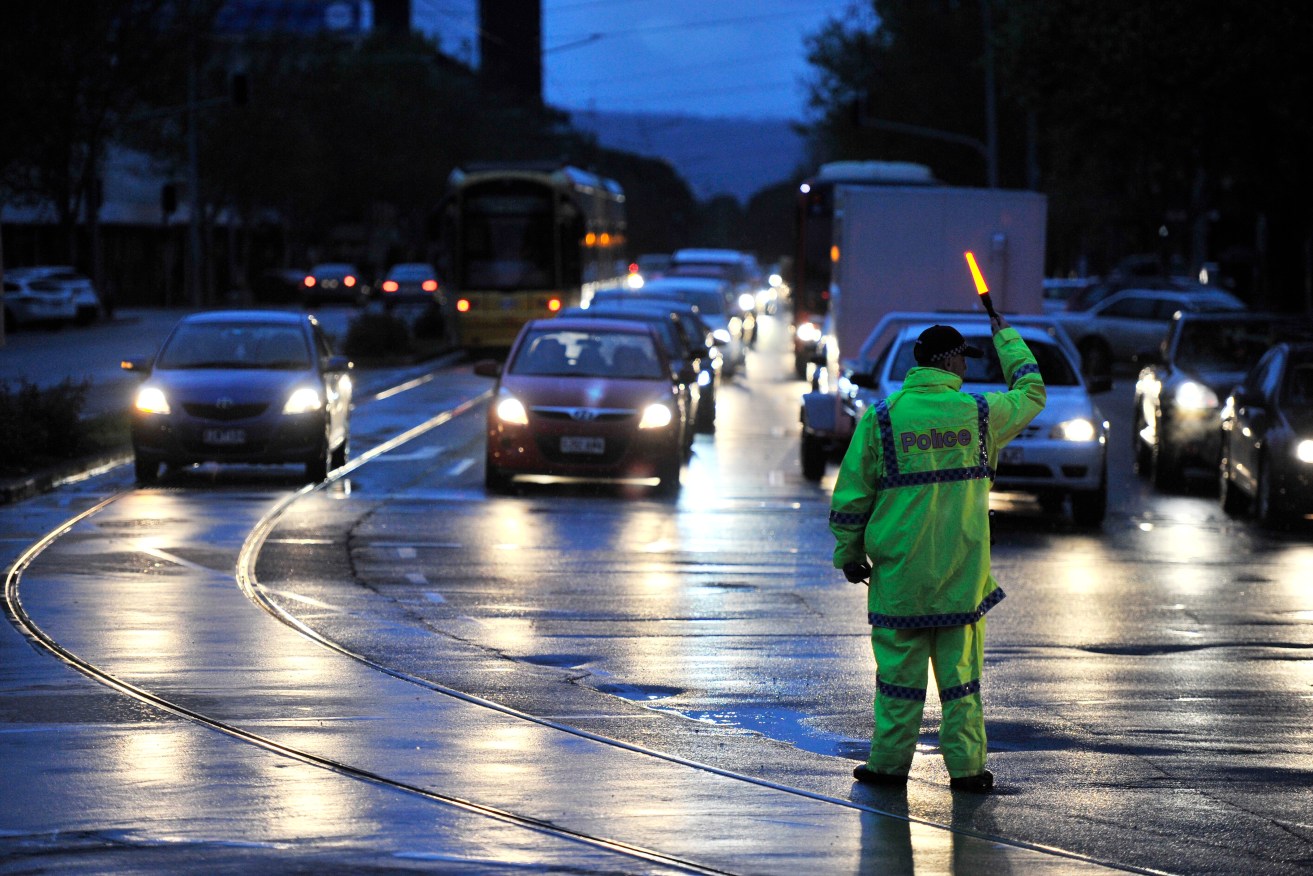“Everything comes with a bill”: Govt weighs up blackout response as Libs seek answers
Disability advocates have demanded the State Government prioritise a recommendation to register “vulnerable persons” who could be endangered by sudden power outages, as the Opposition today intensified inquiries about why the government sat on two damning health reports into the September blackout for almost three months.

The government says Uninterrupted Power Supply at traffic lights "needs to be contemplated - but with regard to the cost". Photo: David Mariuz / AAP
The government yesterday released three reviews into aspects of the statewide September blackout, two of which detailed a combination of human error and extraordinary systemic neglect that led to extended outages at Flinders Medical Centre and Port Augusta hospital.
The government received both of them in November – the Flinders document is dated November 1.
The government has thus far insisted it had “always said both [reports] would be released” in conjunction with yesterday’s review of the state’s emergency services response, a separate inquiry overseen by former police commissioner Gary Burns.
The Liberals today suggested the government kept the reports “secret”, arguing it was reminiscent of initial responses to the recent controversy over a chemotherapy dosing bungle.
“The Weatherill Labor Government promised to be more open and transparent after the chemotherapy dosing saga… this incident shows that nothing has changed – the government is appallingly secretive,” Opposition health spokesman Stephen Wade said today.
“We think it’s appalling that the government sat on the Flinders Medical Report for three months.
“We were heading for a series of blackouts [over] summer… the people of SA have a right to know whether their hospitals are ready.”
In December, the acting chief operating officer of the Southern Adelaide Local Health Network, David Morris, told a parliamentary inquiry into Transforming Health he believed the Flinders review was “either complete or being completed”.
“I don’t know exactly where it’s at… I haven’t seen a completed report,” he said at the time.
Wade said the “people affected by the generator failure as well as the staff at the hospital and the wider community should have been told why the generator failed as soon as the government was made aware”.
Health Minister Jack Snelling responded in a statement that the hospital reports “formed part of the wider Burns Review”.
“The government had always said both would be released at the same time as the Burns review and it is despicable that the Liberal Party is trying so desperately to politicise a tragic event,” he said.
He told media yesterday all recommendations in both health reports had been accepted and had largely been implemented. The Flinders review was prompted by the failure of the facility’s back-up diesel unit, which led to several families losing a total of 50 embryos at a co-located fertility clinic. It’s understood the clinic, Flinders Fertility, was only given a copy of the report early yesterday.
Meanwhile, Dignity Party (formerly Dignity for Disability) MLC Kelly Vincent highlighted calls in the Burns review for “vulnerable” people to be prioritised in planning for sudden power outages.
The report called for “a process for identification and registration of vulnerable persons in the community to ensure an effective support is provided”.
“A number of discussions raised concerns about registration, coordination and contact with vulnerable persons (eg oxygen-dependent),” Burns said in his report.
“The process for validating a person who qualifies with these needs has little accountability, yet a person registered as a vulnerable person can have considerable impact upon a number of agencies and power distributors.
“The issues associated with vulnerable persons during a power outage require a coordinated approach to the administration of and response to vulnerable persons.”
Vincent said in a statement: “There are some South Australian families who literally face issues of life and death if the power goes off – they need some certainty in times of emergency.”
“Whether that is because they are using appliances in the home – such as respirators, alarms or oxygen pumps – or if it is because they need to blend food to a very fine consistency to enable PEG (percutaneous endoscopic gastrostomy) feeding, their lives depend on electricity.
“I have also been contacted by parents from regional areas, who are concerned about their ability to call a doctor or emergency service, because once they connect the National Broadband Network (NBN) with fibre-to-the-node, being without electricity could leave them without a home phone.”
In late 2015 Andrew Tippett, a 53-year-old Wayville resident with muscular dystrophy, died after his breathing machine failed in a power blackout.
Emergency Services Minister Peter Malinauskas told InDaily in a statement: “Mr Burns has produced a thorough report with recommendations deserving of thorough consideration.”
“ As a Labor government, we share Kelly Vincent’s particular concern for the wellbeing of vulnerable persons within the community, so that recommendation will be contemplated carefully along with each of the 62 recommendations,” he said.
However, he has also suggested there will be no rubber-stamping of Burns’ recommendations, noting that “everything comes with a bill”.
“If we ensure [for example] uninterrupted power supply at each of our traffic lights, that will mitigate the problem attached to that, and that needs to be contemplated – but with regard to the cost,” he told FIVEaa today.
Asked earlier about the delay in releasing the hospital reports, Malinauskas told reporters: “I think our obligation to those families and the public generally is to make sure our response is thorough and appropriate.”
“Our job now is to make sure we respond to each review thoroughly,” he said.




